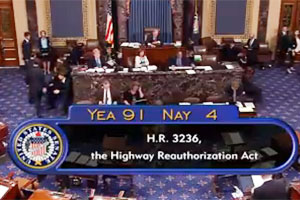Senate Passes Three-Month Highway Funding Patch

White House spokesmen have indicated Obama will sign the patch into law. The legislation passed the Senate 91-4.
The $8 billion patch would mark the third funding extension of the trust fund’s authority in less than a year.
House and Senate Republican leaders, who manage the chambers’ workflow, celebrated the short-term bill’s passage, noting they will have additional time to perfect a six-year transportation policy measure the Senate also passed July 30, 65-34.
“We all share the same goal of completing a long-term bill as soon as possible and ensuring that critical programs do not shut down before we achieve that goal is the right thing to do,” House Transportation and Infrastructure Chairman Bill Shuster (R-Pa.) said.
The Senate advanced its six-year reauthorization bill two hours before clearing the short-term funding fix.
American Trucking Associations issued a statement expressing gratitude for the Senate's action.
“We now look forward to working with the House of Representatives to pass a well-funded bill that provides sufficient revenue for at least six years, with the goal of moving a bill out of a House-Senate conference committee before the next expiration," ATA President Bill Graves said. "Passage of a long-term bill is well overdue, and it is past time for Congress to provide states with the certainty they need to address the enormous backlog in critical highway and bridge improvements.”
The Senate-passed multiyear provision, which House Republican leaders did not take up before they adjourned for five weeks July 29, was seen as a symbolic gesture by senators intent on alleviating funding concerns shared by most of the country’s transportation community.
In passing the long-term bill, California Sen. Barbara Boxer, the top Democrat on the surface transportation panel and one of the bill’s authors, said, “We don’t have to stand here and show tragic photos of bridge collapses and hear about terrible stories of construction workers who can’t make it and have to have food stamps.”
The Senate measure is designed to reform several programs managed by federal trucking regulators, such as the Compliance, Safety, Accountability program’s public scores for carriers. Under the bill, a comprehensive review of the scores would be mandated, and the scores would not be accessible to the public during the review. The measure also would pave the way for commercial drivers under 21 to drive trucks interstate and allow trucking companies to use hair sample testing for drivers.
“This multiyear, bipartisan legislation will give states and local governments the ability to plan for and construct critical infrastructure projects,” said Sen. John Thune (R-S.D.), chairman of the committee that oversees trucking policy.
The six-year bill, which includes a provision reauthorizing the Export-Import Bank, would keep highway programs funded for the first three years of its authorization through $46 billion in transfers from the Treasury's general fund, the Congressional Budget Office indicated. The bill also relies on about $9 billion in offsets of the sale of part of the Strategic Petroleum Reserve.
The bill also would establish a national freight program and authorize $200 million in annual funding for a grant initiative for freight projects. It would boost funding for highway, public transportation and passenger rail programs. And, it would direct the secretary of transportation to establish design standards for transportation projects meant to safely accommodate motorized users as well as non-motorized users.
A proposal to the bill to require the Transportation Secretary to examine the impact of allowing twin 33-foot trailers to operate around the country was not taken up. After the bill passed, Sen. Roger Wicker (R-Miss.), that proposal’s sponsor, said he would “continue to fight against a harmful federal mandate requiring all states, including Mississippi, to allow twin 33-foot tractor-trailers within their jurisdictions regardless of state laws. I believe states are in the best position to make safety decisions about truck size.”
House transportation leaders have not endorsed the Senate’s bill. The most recent long-term highway bill was signed into law in 2005 by President George W. Bush.
Pete Ruane, president and CEO of American Road and Transportation Builders Association, said advancing the patch and the six-year bill “should bring to a close once and for all claims that Congress needs ‘more time’ to develop a long-term reauthorization bill and Highway Trust Fund solution.”
“For more than a year, members of both parties and chambers have used this rationalization for kicking the reauthorization can down the road. The time for any further short-term extensions is over,” Ruane added.
American Association of State Highway and Transportation Officials Executive Director Bud Wright said he welcomed the short-term relief, but, like Ruane, he urged the House to follow the Senate’s lead and “pass a surface transportation bill as soon as possible when they return to D.C. in September.”
Todd Spencer, executive vice president of the Owner-Operator Independent Drivers Association, saw positives about the bill's signing, but also saw some shortcomings. "It’s a step forward in some ways, but there were missed opportunities for relevant, needed reforms to the agency that oversees commercial motor carriers. We have concerns that not only do many regulations fail to improve safety, but some may actually be undermining it."

